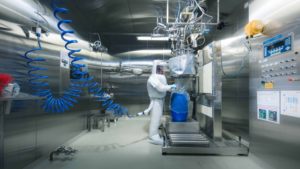
Preclinical antibody stops rheumatoid arthritis
An antibody therapy that targets red blood cells (RBCs) unexpectedly showed anti-inflammatory effects and rapidly reversed rheumatoid arthritis and prevented lung injury in mouse models.
Autoimmune diseases affect almost 5% of the population, but many patients cannot tolerate the long-term use of immunosuppressive therapies. Alternative treatments based on antibodies against red blood cells – such as IVIg or anti-D – have become a standard therapy for immune thrombocytopenic purpura, an autoimmune disease that leads to a dangerously low platelet count. Researchers have theorized that similar erythrocytes-targeting antibodies could be used against other autoimmune diseases, which would give them broad utility as an additional treatment option for various inflammatory conditions.
Research teams from Canada, the US, the Netherlands and Spain headed by Dr. Alan Lazarus have now discovered that the inflammatory antibody Ter119 dampened inflammation in several mouse models of inflammation and autoimmune disease. They found the antibody initially induced a number of changes associated with inflammation in wild-type rodents, such as anemia and a drop in body temperature.
Surprisingly, Ter119 with intact Fc function reduced the severity of arthritis symptoms (in a /BxN serum transfer model) and prevented the accumulation of inflammatory cells in the joints in a mouse model of rheumatoid arthritis. What’s more, Ter119 prevented pulmonary edema and hypothermia in mice with transfusion-related acute lung injury – an inflammatory complication associated with blood transfusions that has no effective treatments.
In mice the antibody induced plasma chemokines CCL2, CCL5, CXCL9, CXCL10, and CCL11 with corresponding alterations in monocyte percentages in the blood and liver within 24 hours. Ter119 attenuated chemokine production from the synovial fluid and prevented the accumulation of inflammatory cells and complement components in the synovium. The authors caution their study did not use antibodies that react with human RBCs and add that more research is needed to determine whether Ter119 could benefit patients with more chronic autoimmune conditions.
However, the team is optimistic. Immunosuppression has long been a cornerstone of treatment for autoimmune disease, said Dr. Alan Lazarus, co-director of the Hematology-Immunology Translational Research Collaboration at the KRCBS and lead author of this study. Our research sheds new light on hard-to-treat diseases. For patients, this may mean a new treatment is only a half-step away – though more research is certainly needed", he added. The next step, Dr. Lazarus said, will be to further understand the mechanism behind why some antibodies are helpful in fighting autoimmune diseases.


 ©FabienMalot
©FabienMalot Lonza Group
Lonza Group Vetter Pharma
Vetter Pharma